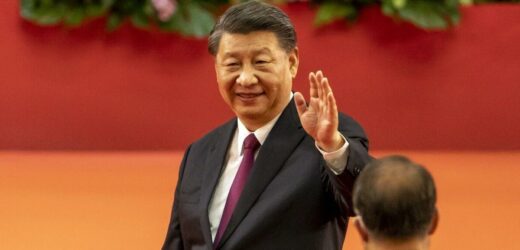Taiwan MP says AUKUS pact is a ‘security net’ against China
We use your sign-up to provide content in ways you’ve consented to and to improve our understanding of you. This may include adverts from us and 3rd parties based on our understanding. You can unsubscribe at any time. More info
Beijing has repeatedly expressed its anger towards the trilateral security pact between the US, UK and Australia. The pact, which provides nuclear-armed submarines to Australia in order to limit the China threat in the Indo-Pacific, could be an obstacle to a Chinese invasion of Taiwan, the island it is claiming sovereignty over.
Previously arguing that AUKUS sets a dangerous precedent by allowing nuclear actors to hand over technology to non-nuclear states, China is now reiterating its fury as tensions in the region soar.
Chinese Government official Zhang Meifang tweeted about a comment made about AUKUS by Chinese Ambassador for Disarmament Affairs Li Song on Monday.
He reportedly said at a conference that “China opposes US-UK-Australia nuclear submarine cooperation”.
Ms Meifang added that the ambassador warned Japan not to copy “nuclear sharing in the Asia-Pacific region”.
For several months, Japanese lawmakers have been locked in nuclear sharing debate, with growing calls for the ruling party to explore a nuclear-sharing arrangement with the US.
But the country, the only wartime target of an atomic bomb, maintains “three non-nuclear principles”.
These are not possessing, not producing and not allowing the introduction of nuclear weapons.
But a new arrangement with the US could involve deploying American nuclear weapons in Japan, carrying them on Japanese fighter jets.
However, Japanese Prime Minister Fumio Kishida
has previously said that this type of arrangement would be “unacceptable”.
LDP Secretary-General Toshimitsu Motegi said an arrangement would be more likely to involve sharing “deterrence, decision-making and political responsibility”, rather than being about “physically sharing actual nuclear weapons”.
But the debates have still sparked fears for China, which has warned against another AUKUS-style pact, something Ambassador Song has called a “textbook case of nuclear proliferation”.
Meanwhile, other Chinese diplomats have said AUKUS “tramples on the spirit of the Treaty on the Non-Proliferation of Nuclear Weapons”.
They have also bashed Australia for attempting to “exploit loopholes by playing dirty”.
However, as China ramps up its military drills around Taiwan, Japan may feel more inclined to stand up to China and protect its ally with a new nuclear treaty.
It comes after US House Speaker Nancy Pelosi visited Taiwan last week, the first to the island by a US House of Representatives speaker in a quarter of a century.
DON’T MISS
Energy breakthrough with world’s most durable hydrogen fuel cell [REVEAL]
Putin’s Iran alliance: Russia to launch spy satellite for Tehran [REPORT]
Putin accused of BURNING his own gas supply [INSIGHT]
China responded by firing multiple missiles into waters surrounding Taiwan, while a major a series of huge military drills was also conducted.
And five of these missiles also flew over Japan’s exclusive economic zone, (EEZ), enraging Japan.
Japanese Defence Minister Nobuo Kishi said that this represents “serious threats to Japan’s national security and the safety of the Japanese people”.
Mr Fumio Kishida has previsouly said that Japan “would like to further strengthen our close partnership with these countries”.
Now that the China threat is ramping up, the East Asian nation may feel more inclined to cosy up with the West to limit Beijing’s threat to the sovereign nation.
However, the Japanese Prime Minister has also said that Japan is “not thinking at all of joining AUKUS right now but our important partners in security and defence like Australia, the United Kingdom and the United States are members of AUKUS”.
Source: Read Full Article







